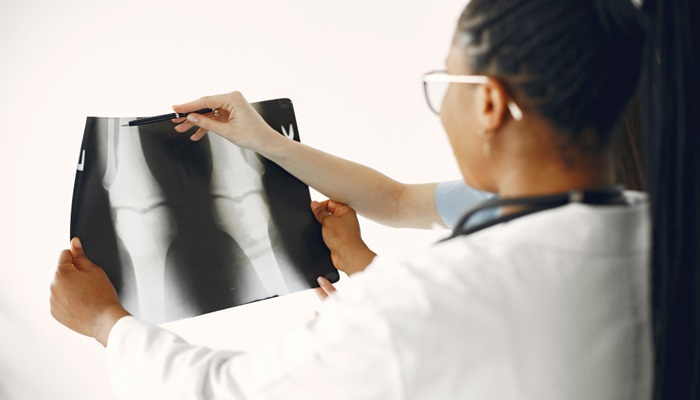A knee MRI is a scan of the knee joint using magnetic waves to obtain internal images of the knee. Primarily, a knee MRI is performed when the knee experiences pain, swelling, or limited mobility. MRI is usually recommended over CT scans and X-rays.
Unlike X-rays, which only show the condition of the bones, MRI provides a clearer image of soft tissues such as the knee joint, muscles, and tendons.
What is a Knee MRI?
A knee MRI is an imaging method that uses magnetic waves to capture detailed images of the knee and surrounding tissues, including bones, cartilage, tendons, muscles, ligaments, and blood vessels. Compared to a CT scan, an MRI can provide more detailed images of knee structures from various angles.
A knee MRI can be performed with or without contrast. A contrast MRI produces clearer images of the knee condition.
Benefits of a Knee MRI
The primary purpose of a knee MRI is to obtain images of the knee. Typically, it is used to diagnose various knee joint issues, such as:
- Swelling, pain, or bleeding in the knee joint
- Cartilage damage, meniscus injuries, ligament, and tendon injuries
- Knee injuries such as sprains or ligament, tendon, and cartilage tears
- Bone fractures that may not appear on X-rays
- Cartilage damage due to osteoarthritis
- Fluid buildup in the knee joint
- Infections (osteomyelitis)
- Tumors in the bones and knee joint
- Osteonecrosis (bone tissue death)
- Knee joint instability
- Reduced knee joint mobility
- Patellar (kneecap) injuries
A knee MRI is also commonly used as an initial examination before undergoing total knee replacement surgery or afterward to monitor the success of the procedure.
Preparing for a Knee MRI
Generally, no special preparation is needed for a knee MRI, as it is a non-invasive examination. Fasting is not required.
However, implanted medical devices made of metal may interact with the strong magnetic field produced by the MRI machine. Inform your doctor before undergoing an MRI if you have:
- A pacemaker
- A cochlear implant
- Aneurysm clips in the brain
- A vagus nerve stimulator
- Surgical mesh
- Plates or screws
- Prosthetic eyes
- Certain types of intrauterine devices (IUDs)
Some of these implants may be MRI-compatible, so confirm this with your doctor.
Additionally, inform your doctor or radiology technician if you:
- Have claustrophobia. The technician may administer mild sedation to help you relax.
- Are pregnant. Although MRI does not involve radiation exposure, it is not recommended for women in their first trimester.
- Have an allergy to contrast dye. If the MRI requires contrast, there is a small risk of an allergic reaction.
Procedure
The steps of a knee MRI procedure include:
- You will be asked to change into a hospital gown and remove all metal accessories, such as jewelry, underwire bras, glasses, and hair clips.
- If undergoing a contrast MRI, a needle will be inserted into your hand or arm for the contrast dye.
- You will lie on your back or side on the examination table in front of the MRI machine.
- The technician may place a cushion to keep your knee or thigh still for clearer images.
- The examination table will slide into the MRI machine to begin the scanning process. You may receive earplugs or headphones to listen to music and reduce the machine’s noise.
- The technician may ask you to hold your breath for a few seconds while capturing images.
- If contrast dye is used, you may feel a cooling sensation at the injection site or slight discomfort.
- The MRI scan typically lasts between 30 to 60 minutes. Once finished, the table will slide out, and you can resume normal activities.
If you were given sedation for claustrophobia, you might need to stay in the hospital for 1-2 hours until the effects wear off.
Risks
Unlike X-rays or CT scans, MRI does not use X-ray radiation, so there is no radiation exposure risk.
However, it is essential to follow the MRI preparation guidelines. Implanted medical devices made of metal may interfere with the strong magnetic field of the MRI machine.
If a contrast MRI is performed, there is a small risk of an allergic reaction to the contrast dye, though it is usually mild and can be treated with antihistamines. You may also experience a metallic taste in your mouth due to the contrast dye.
If you experience persistent knee pain, swelling, or loss of mobility, consult an orthopedic specialist for an evaluation. Your doctor may recommend several tests, including a knee MRI.
Visit Preventive Health Care at Mandaya Royal Hospital to schedule your knee MRI. Contact us via WhatsApp Chat, Book Appointment, or download the Care Dokter app on Google Play and the App Store.



